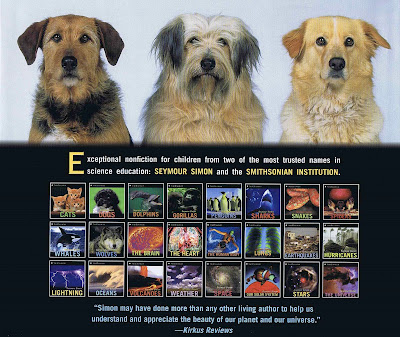March 16, 2010

Last week, I shared 6 things every family should know before deciding to get a puppy, and promised a followup about how to train your new pet. So, here we go!
The first thing that you can teach your puppy is its own name. Always reward a puppy when you call its name and it comes running, either by petting and praising it or by giving it a tidbit. After awhile, just use praise to reward an older puppy. You don’t want to teach it to come only when you have food.
Photo:
Simon, Seymour. DOGS. New York: Collins/Smithsonian, 2009, pg 13.
Don’t use baby talk with a puppy. Keep your commands short, clear and consistent (everyone in the family should use the same words, in a similar tone). A puppy learns by the tone of your voice as well as by the words.
One of the first things you will need to do is paper train your puppy, as soon as it comes home. Spread newspapers on the floor of the room where the puppy is kept, but leave part of the floor bare. Your puppy should be placed on the newspapers as soon as it wakes up from a nap and after each meal. Watch the puppy carefully. As soon as it shows that it wants to squat to relieve itself, rush it over to the newspapers. When it wets the paper, praise it by saying "Good dog, good dog." As you praise your puppy, pet it and make it feel good.
When you see the puppy wet the bare floor, say "Bad dog," in a stern tone. Push its nose to the wet spot and let him know you are unhappy by the tone of your voice. Then place the puppy on the paper and pet it. Clean up the mistake on the floor very thoroughly; you may want to use a few drops of vinegar to disguise the odor of the spot. If the scent of urine remains, it will attract the puppy and it will tend to wet there again. It’s useless to scold a puppy for mistakes a long time after they have been made, so you will have to spend a lot of time watching your puppy in the beginning to get good results. An 8-week-old puppy doesn’t have much control over its bladder and bowel movements, so it will learn much quicker if you watch it so that you can praise it when it goes on the paper.
Then, when you first start to take your puppy outside for walks, take a piece of newspaper with you and repeat the process out of doors. Before long, your puppy will be housebroken.
Other kinds of training should really be started only after your puppy is housebroken. You teach a puppy any new behavior in the same way. Remember that directions should be simple and always in the same tone. Always reward your puppy when it is successful.
Don’t try to teach your puppy too many things at once. Wait until your puppy has learned one thing before you go on to the next. A good command to learn from the beginning is the word "no." Say this firmly and make the puppy stop whatever it is doing. If the puppy stops by itself after you say no, praise and pet the puppy.
"Sit" is the command you will give when you wan your puppy to sit down and be still. Push down on the puppy’s rump and say "sit" in a firm tone of voice. Repeat this until it stays seated without your hand. Then praise the puppy. Most puppies will learn to sit after only a few days.
"Stay" is the command you will give when you want your puppy to remain even when you are walking away from it. Start this kind of training on the leash. Make your puppy sit or lie down and then walk around it while commanding "stay." If the puppy gets up to follow you, pull down on the leash. Repeat this until you can walk the full length of the leash without your puppy moving. Then drop the leash and walk a few feet away, commanding "stay." Constant repetition is the best way to succeed in training.
The more complicated kinds of training are best left until your puppy grows to maturity. You can go to obedience school with your dog and learn together.
Remember that your puppy loves you and wants to please you. Being consistent and clear with your commands and tone, and generous with praise when the puppy follows your command will get the best results.
When you decide to keep a puppy it becomes your responsibility to care for it. You can’t decide that you are just too tired one day to feed your puppy or to take it out for a walk. A well-cared-for and loved puppy will grow up to become your loyal friend for life.

Posted by: Seymour Simon








